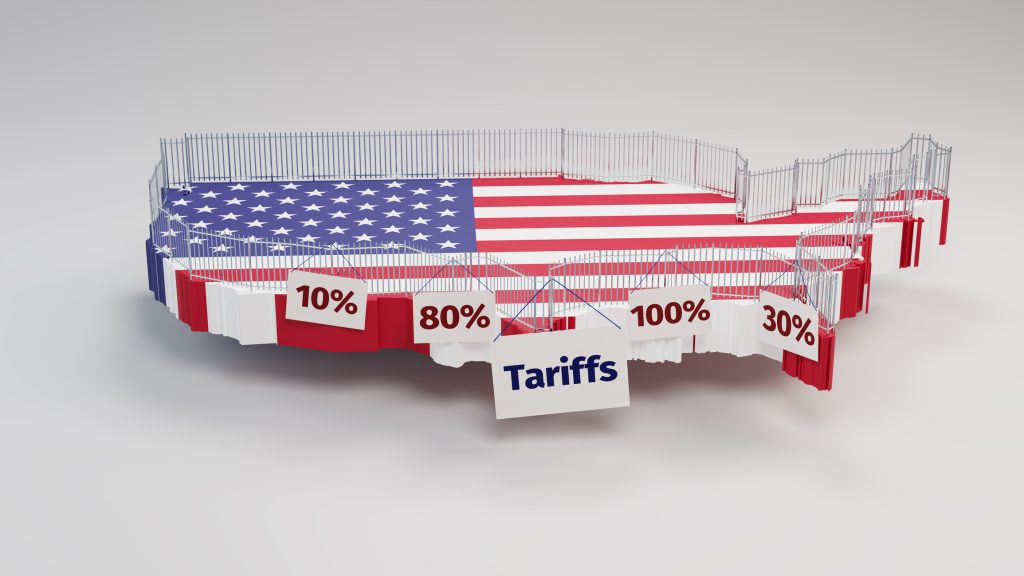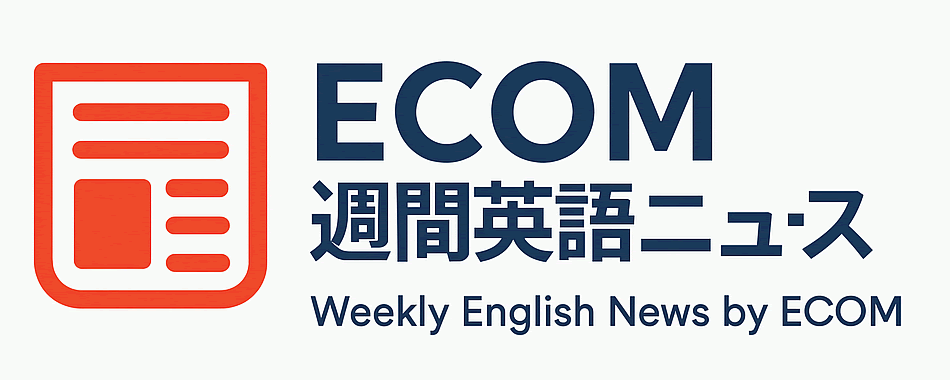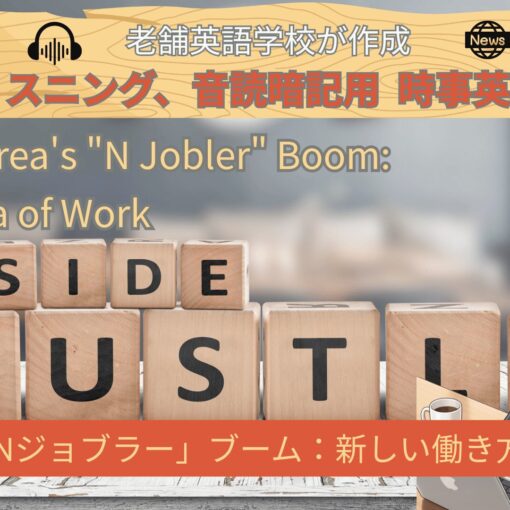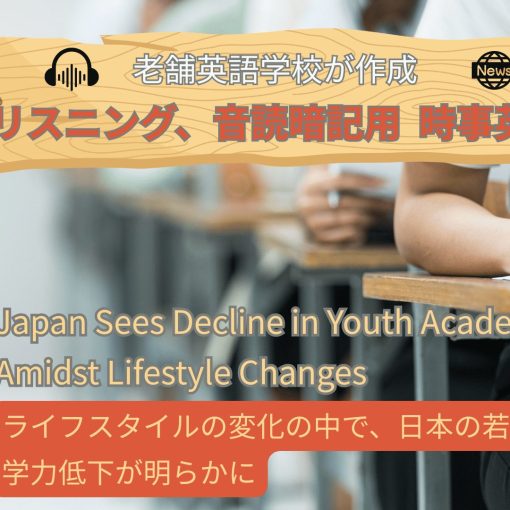
Dr. ECOM:
Hi, George! Have you heard about the new tariffs the government just put on goods from other countries?
George:
Tariffs? That sounds like a big word. What are they?
Dr. ECOM:
Tariffs are like extra fees or taxes we pay when we buy things from other countries. If something comes from China or Europe, for example, the government might charge more money to bring it into the United States.
George:
Why would they do that?
Dr. ECOM:
They want to help American businesses sell more of their own products. By charging extra for items from other countries, our goods might look cheaper and attract more buyers.
George:
But what if I like toys from Europe or snacks from China? Will they cost more now?
Dr. ECOM:
They might. Because of these new tariffs, imported items can become more expensive. When the price goes up, families might have to spend more money to buy them.
George:
That doesn’t sound so great for me or my parents.
Dr. ECOM:
It can be difficult. Some people say tariffs protect American workers. Others worry it could hurt the economy if other countries fight back and tax our products, too.
George:
So, does the whole world get upset when we raise tariffs?
Dr. ECOM:
Sometimes, yes. Other countries might add tariffs on American products in return. Then it becomes a trade war, where each side keeps raising taxes on the other’s goods.
George:
That sounds scary. How can we fix it?
Dr. ECOM:
Leaders in different countries need to talk and find a fair deal for everyone. Some people in our government also want rules so the President can’t set tariffs all by himself.
George:
I hope they figure it out soon. I don’t want everything to get too expensive!
Dr. ECOM:
Me too, George. Let’s keep hoping for a good solution. For now, just remember that tariffs are taxes on goods from other countries. They can help some American businesses but might raise prices for everyday people.
Dr. ECOM:
“Hi, George! Ha** yo** he*** ab*** th* ne* ta**** th* go******** ju** pu* on go*** fr** ot*** co******?”
George:
“Ta****? Th** so**** li** a bi* wo**. Wh** ar* th**?”
Dr. ECOM:
“Ta**** ar* li** ex*** fe** or ta**** we pa* wh** we bu* th**** fr** ot*** co******. If so****** co*** fr** China or Europe, fo* ex****, th* go******** mi*** ch**** mo** mo*** to br** it in** th* United States.”
George:
“Wh** wo**** th** do th**?”
Dr. ECOM:
“Th** wa** to he** Am****** bu******** se** mo** of th*** ow* pr******. By ch**** ex*** fo* it*** fr** ot*** co******, ou* go*** mi*** lo** ch**** an* at**** mo** bu****.”
George:
“Bu* wh** if I li** to** fr** Europe or sn**** fr** China? Wi** th** co** mo** no*?”
Dr. ECOM:
“Th** mi***. Be**** of th*** ne* ta****, im***** it*** ca* be**** mo** ex******. Wh** th* pr*** go** up, fa****** mi*** ha** to sp*** mo** mo*** to bu* th**.”
George:
“Th** do**** so**** so gr*** fo* me or my pa*****.”
Dr. ECOM:
“It ca* be di******. So** pe**** sa* ta**** pr***** Am****** wo****. Ot*** wo*** it co*** hu** th* ec***** if ot*** co****** fi*** ba** an* ta* ou* pr******, to*.”
George:
“So, do** th* wh*** wo*** ge* up*** wh** we ra*** ta****?”
Dr. ECOM:
“So******, ye*. Ot*** co****** mi*** ad* ta**** on Am****** pr****** in re****. Th** it be**** a tr*** wa*, wh*** ea** si** ke*** ra**** ta**** on th* ot***’s go***.”
George:
“Th** so**** sc***. Ho* ca* we fi* it?”
Dr. ECOM:
“Le**** in di****** co****** ne** to ta** an* fi** a fa** de** fo* ev******. So** pe**** in ou* go******** al** wa** ru*** so th* Pr******* ca**’t se* ta**** al* by hi******.”
George:
“I ho** th** fi**** it ou* so**. I do**** wa** ev****** to ge* to* ex******!”
Dr. ECOM:
“Me to**, George. Le** ke** ho**** fo* a go** so******. Fo* no*, ju** re****** th** ta**** ar* ta**** on go*** fr** ot*** co******. Th** ca* he** so** Am****** bu******** bu* mi*** ra**** pr**** fo* ev****** pe****.”
■ Vocabulary:
put on goods
- 和訳:「(関税を)商品にかける」
- 解説:「put on」は「~に課す、加える」の意味で、「goods」は「商品」を指します。
tariffs are like extra fees or taxes
- 和訳:「関税は追加の料金や税金のようなもの」
- 解説:「fees」「taxes」はどちらも「支払うお金」ですが、「extra」は「追加」という意味で、「本来の価格に上乗せされるもの」というニュアンスがあります。
government might charge more money
- 和訳:「政府は追加のお金を請求する(課す)かもしれない」
- 解説:「charge」は「請求する」「課金する」という意味で、サービスや商品に対してお金を徴収する際に使われます。
imported items
- 和訳:「輸入品」
- 解説:「imported」は「輸入された」の意味。「imported items」で「輸入された品物」となります。
fight back
- 和訳:「反撃する、やり返す」
- 解説:相手からの行為に対して同じように行為を仕返すことを表します。貿易の文脈では「報復措置を取る」イメージ。
trade war
- 和訳:「貿易戦争」
- 解説:国同士が互いに関税をかけ合うなどして、貿易上の対立が深刻化する状態を指します。
figure it out
- 和訳:「解決する、答えを見つけ出す」
- 解説:「figure out」は「考えて答えを出す」「問題を解明する」という意味の句動詞です。
for now
- 和訳:「とりあえず、今のところは」
- 解説:現在の状況や暫定的な判断を示す表現で、「将来は変わる可能性がある」というニュアンスを含みます。
find a fair deal
- 和訳:「公正な合意を見つける」
- 解説:「fair deal」は「公正な取り決め」「妥当な折衷案」などのイメージを持ち、交渉や話し合いでよく使われます。
■ 和訳
Dr. ECOM:
「やあ、ジョージ! アメリカ政府が他の国からの商品に新しく関税をかけたって聞いたことある?」
George:
「関税? それって難しそうな言葉だね。何なの?」
Dr. ECOM:
「関税っていうのは、外国から物を買うときに、余分にお金を払わないといけなくなる仕組みなんだ。たとえば、中国やヨーロッパから来たものに対して、アメリカ政府が追加のお金をとることがあるんだよ。」
George:
「どうしてそんなことをするの?」
Dr. ECOM:
「アメリカの会社が自分たちの商品をもっと売れるようにしたいからなんだ。外国の物に余分なお金がかかれば、そのぶんアメリカの物が安く見えるから、買ってもらいやすくなるって考えなんだよ。」
George:
「でも、ぼくがヨーロッパのオモチャや中国のお菓子が好きだったら、もっと高くなるんじゃない?」
Dr. ECOM:
「そうかもしれないね。こういう関税があると、輸入品の値段が上がる可能性がある。値段が上がれば、みんなが買うときに前より多くお金を払わないといけなくなる。」
George:
「それって、ぼくにも両親にもあまり嬉しくないよ。」
Dr. ECOM:
「そうだよね。関税はアメリカの働く人を守るっていう考え方もあるけど、反対に他の国がアメリカの品物にも税金をかけ返して、経済が悪くなるんじゃないかって心配もあるんだ。」
George:
「じゃあ、アメリカが関税を上げると、世界中が怒ったりするの?」
Dr. ECOM:
「そういうこともあるんだ。他の国も仕返しにアメリカの商品に関税をかけて、貿易戦争みたいになってしまうんだよ。」
George:
「なんだか怖いね。どうすれば直せるの?」
Dr. ECOM:
「国のリーダーたちが話し合って、みんなにとっていい合意を見つけなきゃいけないんだ。あと、うちの国でも大統領が自由に関税を設定できないようにしようっていう動きもあるんだよ。」
George:
「早く解決してほしいな。何もかも高くなるのは嫌だよ。」
Dr. ECOM:
「本当だね、ジョージ。いい解決策が見つかるといいんだけど。とりあえず、覚えておいてほしいのは、関税っていうのは外国からのものにかかる税金なんだってこと。アメリカの会社を助けることもあるけど、普通の人の買い物が高くなる可能性があるんだよ。」
ECOMでは、毎週これらの記事を、ディスカッション教材として使え、先生が音読の発音チェックもしてくれます。
興味がある方は体験レッスンをご活用ください。





